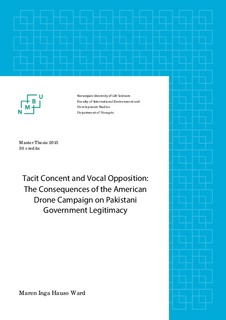| dc.description.abstract | The purpose of this thesis is to address how the American drone campaign in the Federally Administered Tribal Areas (FATA) of Pakistan has influenced the legitimacy of the Pakistani government. The study has been two-folded; the first part is founded in a local perspective, i.e. how drone strikes affect the local populations of North and South Waziristan. The second part has a more broad perspective, focusing on the government’s standing on the campaign, their vocal opposition and tacit consent, as well as the security situation today and how this had been affected by the drone strikes.
The thesis is founded on the concept of legitimacy and second-hand sources on the FATA and the drone campaign; archival studies has been applied for collecting these data, which consists of scholarly articles, books, reports, official documents and news paper articles.
The first part of the thesis finds that the drone campaign influences the local populations on several points; through breaches in human security, in an economic perspective, and through impacting mental health by creating fear, anticipatory fear, and a change in behavior due to constant surveillance. The legitimacy of the government is affected negatively by the drone campaign; the government fails to provide an environment where the citizens can feel secure. The thesis also identifies how the government could maintain or increase its legitimacy. The second part of the discussion demonstrates the government’s standing on the issue; how it publically opposes the drone campaign whilst covertly cooperating with the CIA. The consequences of this is discussed, along with why this distance between what is said and done by the government decreases their legitimacy, and what could have been done to improve the
situation. Further, the importance of public perceptions is discussed, along with the
consequences decreasing legitimacy has on the newly democratic Pakistan. Finalizing the discussion, the thesis touches upon the security situation over the last decade, and asks whether the drones increase security or undermines it. | nb_NO |
